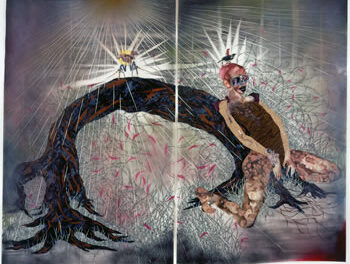One of the bonuses of having musicians move here from far away places is that they invite their friends. Bonnie Thron, principal cellist with the NCS and her husband, free-lance clarinetist Fred Jacobowitz, moved here from Baltimore four years ago. Tuesday evening they were joined in a refreshingly eclectic concert by an old friend, pianist Adam Mahonske, a faculty member of the Baltimore School of the Arts and an active soloist and chamber player. The audience included the usual suspects.
For space and ambience, Smedes Parlor is the ideal setting for chamber music (except for the paintings); as far as acoustics – it is not. The room is full of echoes, strange reverberations and a noisy ventilation system. Last night, in an attempt to make the atmosphere more intimate, the music making was rotated 90 degrees from the narrow end of the room to the middle of the long wall, with the chairs in a semicircle around the “stage.” The acoustical results were not successful; the sound was even muddier than in the traditional configuration. But it was worth a try. In future, we recommend a return to the long, narrow configuration with perhaps a few more oriental carpets to dampen the reverberation.
The program opened with probably the most popular of Igor Stravinsky’s few chamber works, the Suite Italienne in its cello and piano version. The Suite is an arrangement of five sections of the ballet Pulcinella, arranged for cello at the request of cellist Gregor Piatigorsky, whose hand can be felt in the transcription. It is a showcase for the cello, and much of the spikiness and hard edge of Stravinsky’s original ballet is retained in the cello part, although the piano accompaniment is oddly backward looking and prosaic, with a more romantic cast than we are used to hearing from Stravinsky. Thron, however, tried to retain the angularity of the original score, even to the point of misfiring with occasional squeaks in more percussive moments. On the other hand, she tended to round off the phrases with sharp diminuendos that were frequently lost underneath the piano. Mahonske’s adroit phrasing also came off imperfectly because of the two had difficulty in maintaining the balance in the echo-rich hall. A half-lowered lid on the piano might have helped.
Just before Thron left Baltimore, local musician and visual artist David Simon composed a “Duo for Bonnie and Adam,” a nice gesture of appreciation to the two who frequently used to perform together. Last night, four years later, Thron and Mahonske finally premiered the work. Simon, a talented amateur composer born in 1925, obviously has a nostalgic turn of mind, his Duo harking back to the language of Les Six.
In the late 1840s, with the growth of the Robert Schumann family, Clara’s concert travels became restricted. Domestic music-making with friends from the Dresden Court Orchestra became a musical mainstay in the household. For these occasions Schumann composed a series of works for two or three instruments, which – while written for a specific instrument – usually were marked “ad libitum Violine oder Violincello” have been transcribed for just about any instrument with piano. The Adagio and Allegro Op.70, for example, was originally composed for French horn and piano but is usually performed with cello. Thron and Mahonske brought out the discursive character of the Adagio, a conversation between friends, and gave us a wild ride in the explosive, Allegro.
After intermission, Jacobowitz joined the two in Johannes Brahms’s Clarinet Trio, Op.114. Like all late Brahms chamber works, this trio requires a contemplative – often called autumnal – approach, and the three performers gave a reading with appropriate gentleness and excellent balance. It is a pity we do not hear Jacobowitz more frequently around here. He is an excellent clarinetist, with a warm tone and great sensitivity.
All three performers felt obligated to follow the current tradition of oral program notes. Unfortunately the comments added little to the music, and some were not even historically correct. To write, and especially talk, about music is a different art from performing. The best remarks from the stage give the impression of spontaneity and intimacy – yet are rigorously planned and rehearsed.
Finally, as the fall concert season gets into gear, let us all be thankful for the richness of our musical life here in the Triangle. In a post-concert conversation with Mahonske about the classical music scene in Baltimore, a city three times the size of Raleigh, the pianist reminded us of the financially strapped and struggling Baltimore Symphony Orchestra and was hard-pressed to name even a handful of classical series without requiring trips to D.C. or Philly.











